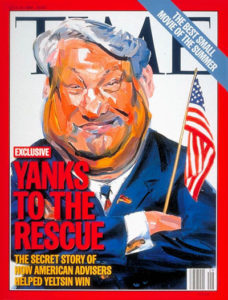 Let us take as a given that Russia interfered in the last US election (though many of the accusations are unconvincing, some appear to be be true).
Let us take as a given that Russia interfered in the last US election (though many of the accusations are unconvincing, some appear to be be true).
I’m pushing this back to the top, for what I assume are obvious reasons. Originally published Feb 1, 2018.
Why did they interfere?
They most likely did so because having a President in charge who was somewhat favorable to Russia is in Russia’s self interest. Remember that Russia is under US-led economic sanctions.
There is a case to be made that what Russia did was simply what Russia should have done: Act in its own self-interests. Russia should do what is in its self-interest.
Moreover, it is the same as the US does to other countries, all the time, including to Russia. When the US thinks that a country should have different leadership, it tries to make sure that happens. Such operations include political support, propaganda, and often support for violence. Money is funneled to opposition factions. The color-revolutions were US supported and so were the Maidan protests which overthrew the elected Ukrainian government and caused the most recent big crisis with Russia. There are many, many examples, including extensive support for anti-government forces in Iran.
The US does this because they think it is in their interest. If they think a democratic party is good for the US, they support it, but they have supported dictators and anti-democratic coups as well.
So what Russia is doing has a lot of precedent. The US is not some trembling innocent suffering some unspeakable crime. The better analogy is a serial bully who got his eye blacked by a past victim.
From the outside, Americans screaming about this look like a bully screaming, “How dare you do to me what I do to everyone else. I’m going to bury you!”
This does not induce sympathy.
Still, we can make a strong case that countries shouldn’t interfere in other countries’ internal political affairs, including–especially including–elections.
I think that the Russians might be willing to agree to that.
So the sane method of dealing with this issue, to which which virtually everyone will agree, would be to begin negotiations towards that end.
Americans and Russians get together and have frank talks, which amount to a peace treaty: We won’t do it to you, if you don’t do it to us.
They might even extend the notion to not doing it to other countries.
This is the actual road out, though it’s laughable because it really seems impossible to imagine. Both the US and Russia have been interfering in many countries for a long time, though the US has been the champion for the last 30 years or so–and by a wide margin.
But if you don’t want someone to hit you, perhaps you shouldn’t hit them?
The problem here is that this can’t stand alone. If the US retains the ability to sanction other countries economically, in ways that are so damaging that they kill vast numbers of those countries’ citizens and impoverish even more, which the US does, who is going to agree to just sit there and take it?
And the US does have this ability, for now, due to its control over the world payments system. The US Treasury can unilaterally sanction countries and firms, and no one can stop them, because banks outside the US feel compelled to obey as any transfer that touches on the US triggers US law, and the payment system is US built and controlled.
Most foreign debts are also subject to either US or British law, as the Argentinians learned to their great detriment.
But then, doesn’t the concept of sanctions fall under the general idea of interfering with other countries? Perhaps the US might also wish to stop sanctioning countries. Almost every case has done more harm than good, and the sanctions almost always hit ordinary people harder than leaders, even when they are targeted at the richest.
The way to have peace, is to leave other people alone.
I know that this runs exactly against the American character which is, “Hurt them until they do what I want.” It runs directly against how the US disciplines its own people, which is, “If you don’t cooperate, you’ll be poor and miserable.” (See how felons are treated after their incarceration for the most direct example.)
But perhaps, just perhaps, the best results in this world rarely come from hurting people until they submit, however long that takes. (See Cuba and Iran for how long it can not work.)
Oh, sure, sometimes it does “work.” The US has overthrown many countries’ governments, and they have gotten many other political parties elected. No one can deny this. But somehow, doing so often leads to even worse situations down the line. It seems that if you hurt people enough, they resist and start hating you, act against you, and try to get a government they like that doesn’t like you, and so on.
Sanity is saying “Okay, okay. Let’s stop this cycle of reciprocally hurting people.”
But that has to start and be credibly initiated by the worst abuser. And though most Americans won’t admit it, that worst abuser is the US.
This has been another episode of “Kindergarten-level Ethics for Adults.”
If you don’t like it when someone does it to you, don’t do it to other people.
The results of the work I do, like this article, are free, but food isn’t, so if you value my work, please DONATE or SUBSCRIBE.
